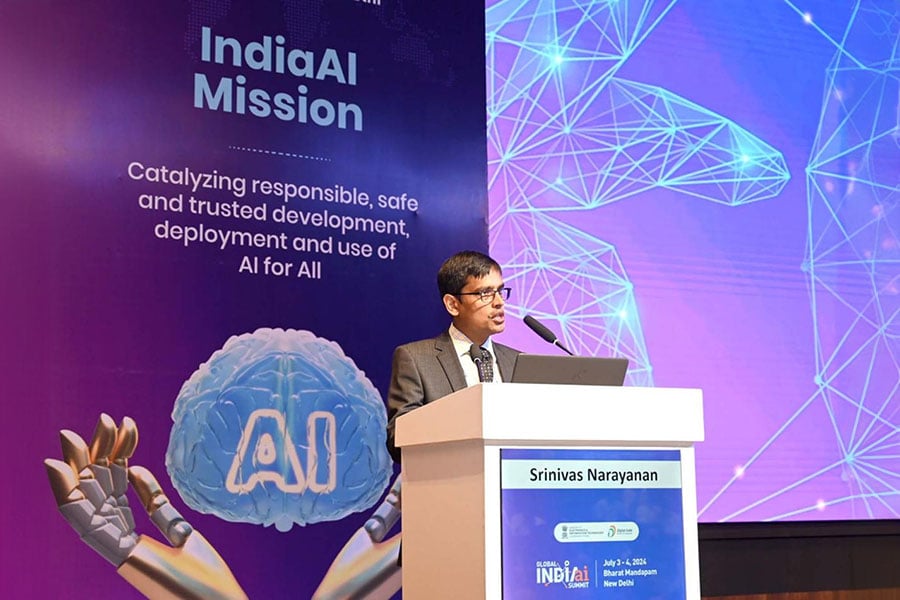Meet Srinivas Narayanan, OpenAI's Indian-origin VP
The vice president of ChatGPT-maker on July 3 inaugurated the Global INDIAai Summit 2024 in the capital city alongside ministers and MeitY officials. He spoke about how AI has added speed and dynamism to an already-vibrant entrepreneurial ecosystem in India
 Srinivas Narayanan, VP of Applied at OpenAI
Srinivas Narayanan, VP of Applied at OpenAI
The auditorium in New Delhi’s Bharat Mandapam was buzzing on Wednesday with industry veterans, students, delegates of 15 member countries of the Global Partnership on Artificial Intelligence (GPAI), and ministers from the central government. Leaders of global tech giants like Nvidia, AMD, Microsoft, Intel and AWS were also present. Among everyone, OpenAI’s Indian-origin vice president attracted the most attention, with attendees gathering around him for a selfie. Srinivas Narayanan inaugurated the Global INDIAai Summit 2024 alongside IT Minister Ashwini Vaishnaw, the Government of Japan’s Hiroshi Yoshida, Union Minister of State for Electronics and IT Jitin Prasada, Nasscom President Debjani Ghosh, and MeitY officials.
Narayanan grew up in Chennai and first learnt about artificial intelligence (AI) in 1994. During his undergraduate days at IIT-Madras, he wrote his first AI chess program. “Unlike the chess kids from Chennai these days, my AI chess wasn't very good. So, I couldn't have imagined back then that 30 years later, I would be talking about AI at a prestigious forum like this,” he said, addressing the gathering.
During his talk at the summit, Narayanan stressed on the importance of building artificial general intelligence that is safe and beneficial for all of humanity. He also spoke about how OpenAI leadership has been closely connected with India and keeping it in mind in the important decisions that they are making. Edited excerpts:
Why AI is exciting now
In the last decade, the entire field has witnessed huge progress in AI. And in the last five years, we've seen huge progress in our ability to build generally intelligent models. We launched ChatGPT just a year-and-a-half ago and thought it would be a low-key research preview. But in the last 18 months, we have seen that people are using it in transformative ways. It's impacting people's daily lives in all sorts of ways that we hadn't imagined, including here in India. This has created a new interface to computing; it's a natural way to engage with technology that is conversational. We are using that to get things done. When you have generally intelligent systems, people are able to put them to use in lots of different applications. Providing expertise at scale is one of the most important challenges for society. We're seeing AI being used in lots of new industries across the world.Also read: Will Nvidia's AI gold rush continue?
How is India harnessing AI in 2024?
AI has added speed and dynamism to the already-dynamic entrepreneurial ecosystem in India. Entrepreneurs understand market gaps; they are building innovative products, and tools like ChatGPT are helping them accelerate this in completely new ways. We're reducing the cost of intelligence. We're enabling developers to write code and helping them create completely conversational and natural interfaces to computing. This is helping people be a lot more productive and opening up opportunities for higher-level problem solving.In agriculture, AI is making it possible to provide more support to farmers in rural communities. Agricultural agents help farmers navigate a changing climate, implement best practices, and bring their crops to market. But it's often difficult to ensure that there are enough agents in a country of this scale and diversity. In India, there are about 650 farmers for each agent. The NGO Digital Green has been working with the Ministry of Agriculture to address this challenge. They’ve developed a chatbot on GPT4, which is helping people get more relevant advice sooner, and this works across many languages. Reducing language barriers is one of the superpowers of large language models (LLMs). Education is another area that's incredibly important, and providing personalised education at scale is also a massive opportunity. Companies like Physics Wallah are building on our products to deliver personalised exam preparation to millions of people.


















